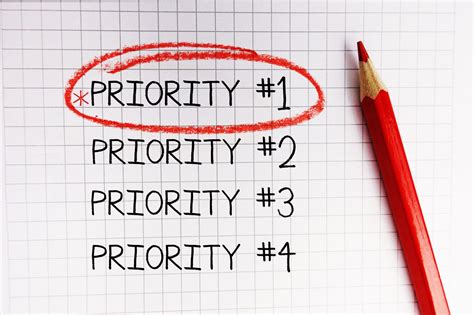Time management plays a pivotal role in achieving desired goals and maintaining a balanced lifestyle. Being able to effectively manage your time allows you to optimize productivity, reduce stress, and ultimately, achieve success. Mastering the art of time management requires a combination of organization, prioritization, and discipline.
Within the realm of time management, there are various strategies and techniques that can be employed to improve efficiency. Whether you are a student juggling multiple assignments, a professional aiming to meet deadlines, or an individual seeking personal growth, enhancing your time management skills should be a top priority.
Maximizing productivity starts with setting clear objectives and establishing realistic timelines. By clearly defining your goals and creating a structured plan, you are able to allocate appropriate time and resources to each task. This ensures that your efforts are focused, eliminating the likelihood of distractions and allowing you to accomplish more in less time.
Another essential aspect of effective time management is the ability to prioritize tasks based on their importance and urgency. Not all tasks are created equal, and some hold greater significance in relation to your overall objectives. Prioritization allows you to identify and tackle the most critical tasks first, minimizing the risk of important deadlines being missed or essential responsibilities being neglected.
Prioritize Your Tasks

Effective time management involves the skill of effectively prioritizing your tasks. This is an essential aspect of maximizing productivity and achieving your goals. Prioritization allows you to allocate your time and effort to the most important and urgent tasks, while ensuring that less important or lower-priority tasks are not neglected.
When it comes to prioritizing your tasks, it is crucial to understand the significance and urgency of each task. By identifying the tasks that have the greatest impact or contribute directly to your goals, you can focus your energy on them first. This involves determining the importance of each task based on its relevance, potential consequences, and overall value to your overall objectives.
Additionally, it can be helpful to categorize your tasks into different levels of priority. This can be done by using a system such as assigning high, medium, or low priority tags or numbers to each task. By doing so, you gain a clearer understanding of which tasks require immediate attention, which can be postponed, and which can be delegated to others if necessary.
Another aspect of effective prioritization is recognizing the importance of time constraints. Some tasks may have deadlines or time-sensitive components that need to be considered. By factoring in these time constraints, you can ensure that you allocate your time accordingly and complete tasks in a timely manner.
In summary, prioritizing your tasks is a key element of improving your time management skills. By understanding the significance and urgency of each task, categorizing them based on priority levels, and considering time constraints, you can better manage your time, increase your efficiency, and achieve your goals more effectively.
Master the Art of Delegating
Discover the art of empowering others to assist you in accomplishing tasks, thereby maximizing your time and productivity.
- Delegate effectively: Learn the skills required to assign appropriate tasks to others.
- Trust your team: Build trust and confidence in your team members, allowing them to take ownership and responsibility for their delegated tasks.
- Effective communication: Master the art of providing clear instructions and expectations to ensure successful outcomes.
- Identify strengths: Understand the strengths and abilities of your team members, enabling you to delegate tasks that align with their competencies.
- Monitor progress: Implement mechanisms to monitor the progress of delegated tasks, ensuring they are on track and meeting milestones.
- Provide support: Offer guidance and support to your team members throughout the delegation process to ensure their success.
- Encourage growth: Delegating tasks provides opportunities for personal and professional growth for both you and your team members.
Embracing the concept of delegation not only lightens your workload but also fosters a collaborative and efficient work environment. By effectively assigning tasks to others, you can free up your time to focus on strategic priorities and enhance overall productivity.
Effective Time-Blocking Strategies to Optimize Productivity

Discover techniques to effectively manage and allocate your time by implementing time-blocking strategies. By utilizing this proven method, you can enhance your productivity and make the most out of your day without feeling overwhelmed or distracted.
One powerful way to approach time management is through time-blocking, a method that involves segmenting your day into distinct blocks of time dedicated to specific tasks or activities. This approach aims to improve focus, eliminate multitasking, and ensure that important tasks receive the attention they deserve. Rather than allowing your day to be dictated by a never-ending to-do list, time-blocking empowers you to take control and proactively plan your time.
When implementing time-blocking, start by identifying your priorities and goals. Determine which tasks or projects require the most focus and allocate dedicated time blocks for them. By assigning specific time slots to each task, you create a structured framework that enables greater concentration and reduces the possibility of procrastination.
Experiment with different time block durations to find what works best for you. For some individuals, shorter blocks of 30 minutes to an hour suit their concentration span, while others prefer longer intervals of two to three hours for more complex tasks. Adapting your time blocks to align with your productivity levels can optimize your focus and prevent burnout.
It is essential to establish boundaries during your time blocks. Minimize external distractions by turning off notifications on your phone, closing unnecessary tabs on your computer, and setting clear expectations with colleagues or family members. Treat your time block as sacrosanct, prioritizing the task at hand and avoiding interruptions that could derail your progress.
Remember to incorporate breaks into your time-blocking schedule. Breaks act as rejuvenating intervals that allow you to recharge and maintain productivity over extended periods. Whether it's a short walk outside, a stretching session, or enjoying a cup of tea, taking regular breaks can prevent mental fatigue and increase overall efficiency.
Incorporating time-blocking into your routine requires discipline and consistency. It may take time to adapt to this new approach, but with practice, it can become a valuable tool for enhancing your time management abilities. By implementing these time-blocking techniques, you can gain greater control over your day, accomplish tasks more efficiently, and create a balance between work and personal life.
Avoiding Procrastination
Overcoming the tendency to put tasks off until later is essential for effective time management. By adopting strategies to eliminate procrastination, you can optimize your productivity and achieve better results. By understanding the underlying causes of procrastination and implementing proven techniques, you can break the cycle of delay and take control of your time.
One way to combat procrastination is to set specific and achievable goals. Breaking down larger tasks into smaller, manageable steps can make them less overwhelming and easier to tackle. Additionally, prioritizing tasks based on their importance and urgency can help you allocate your time more efficiently.
Maintaining focus and avoiding distractions is another key aspect of avoiding procrastination. Identifying potential distractions and finding ways to eliminate or minimize their impact on your work can significantly improve your productivity. Utilizing time management techniques such as the Pomodoro Technique, which involves working in short bursts of intense focus followed by short breaks, can also help maintain concentration and overcome procrastination.
Building accountability and accountability systems is crucial in avoiding procrastination. Sharing your goals and deadlines with others, whether it's a colleague, friend, or family member, can provide an external source of motivation and encouragement. Additionally, setting up rewards or consequences for meeting or missing deadlines can help reinforce productive habits and deter procrastination.
Avoiding perfectionism is another critical factor in overcoming procrastination. Striving for perfection can often lead to procrastination as the fear of making mistakes or not meeting unrealistic standards can be paralyzing. Learning to accept imperfections and focusing on progress rather than perfection can help alleviate the pressure and keep you moving forward.
In conclusion, preventing procrastination is crucial for effective time management. By setting goals, maintaining focus, establishing accountability, and avoiding perfectionism, you can overcome this common challenge and make the most of your time.
Setting Attainable Targets

Ensuring that your objectives are achievable and within reach is a fundamental principle in enhancing your time management skills. By setting realistic goals, you can effectively plan and prioritize your tasks, leading to increased productivity and efficiency.
| Advantages of Setting Realistic Goals |
|---|
| 1. Focus and Direction |
| Setting realistic goals provides you with a clear focus and direction, allowing you to align your efforts and allocate your time wisely towards tasks that are truly important and impactful. |
| 2. Motivation and Confidence |
| When you set goals that are attainable, you are more likely to feel motivated and confident in your abilities to accomplish them. This positive mindset propels you forward, increasing your chances of success. |
| 3. Effective Time Allocation |
| Realistic goals enable you to allocate your time effectively by breaking down larger tasks into smaller, manageable steps. This approach facilitates better planning and prevents overwhelm, ensuring each task is given adequate attention and effort. |
| 4. Accomplishment and Satisfaction |
| By setting goals that are realistically within your grasp, you increase your chances of accomplishment. Each completed objective brings a sense of satisfaction, boosting your motivation and driving you to tackle the next goal on your list. |
In conclusion, setting realistic goals is pivotal in enhancing your time management skills. It empowers you to focus, motivates you to take action, facilitates effective time allocation, and brings a sense of accomplishment and satisfaction. Take the time to evaluate your objectives and ensure they are within reach, allowing you to make the most of your time and achieve your desired outcomes.
Take Regular Breaks
Refresh your mind and increase your productivity by incorporating regular breaks into your daily routine. It is crucial to allocate time for rejuvenation and relaxation throughout the day to optimize your time management skills.
Breaks play a vital role in maintaining focus and sustaining your energy levels. Engaging in short periods of rest allows your mind to recharge, enhancing your ability to concentrate and perform tasks effectively. Furthermore, taking breaks promotes creativity and problem-solving skills, as it gives your brain the opportunity to process information and generate new ideas.
When incorporating breaks into your schedule, consider taking both shorter and longer ones. Short breaks of 5-10 minutes every hour can provide much-needed relief from continuous work, allowing you to stretch, walk around, or simply rest your eyes. Longer breaks, such as a lunch break or an extended break in the afternoon, offer a chance to step away from work completely and engage in activities that help you relax and re-energize.
During your breaks, make sure to engage in activities that genuinely help you unwind and recharge. This could involve practicing mindfulness exercises, enjoying a refreshing beverage, listening to music, or engaging in light physical exercise. Avoid activities that are mentally taxing or time-consuming, as the goal is to take a break from work-related tasks and responsibilities.
Remember, taking regular breaks is not a waste of time, but rather an investment in your overall productivity and well-being. Prioritize self-care and incorporate moments of rest into your daily routine, and you'll find yourself more focused, motivated, and efficient in managing your time effectively.
FAQ
What are some practical tips for improving time management skills?
Some practical tips for enhancing time management abilities include setting clear goals, prioritizing tasks, creating a schedule or to-do list, minimizing distractions, and delegating tasks when possible. It's also important to take regular breaks and practice effective time-tracking methods.
How can I set achievable goals that help me manage my time better?
To set achievable goals that aid in time management, it is essential to make them specific, measurable, attainable, relevant, and time-bound. By breaking larger goals into smaller, manageable tasks, it becomes easier to prioritize and allocate time effectively. Additionally, regularly reviewing and adjusting goals can help ensure they remain realistic.
What strategies can I employ to avoid procrastination and stay focused?
To avoid procrastination and maintain focus, it can be helpful to break tasks into smaller, more manageable chunks. Utilizing techniques such as the Pomodoro Technique (working for specific time intervals with short breaks) or implementing time blocking (allocating specific time slots for different tasks) can also aid in staying on track. Additionally, removing distractions, creating a conducive workspace, and practicing self-discipline are key strategies to avoid procrastination.
How can I effectively prioritize my tasks to make the most of my time?
Effective task prioritization can be achieved by identifying urgent and important tasks and focusing on completing them first. The Eisenhower Matrix, which categorizes tasks into four quadrants based on their urgency and importance, can be a helpful tool. Additionally, considering deadlines, dependencies, and the potential impact of completing a task can assist in determining its priority. Regularly reassessing and reorganizing priorities based on changing circumstances is also crucial.
What are some strategies for delegating tasks and managing my workload efficiently?
To delegate tasks and manage workload efficiently, it is important to first identify tasks that can be assigned to others based on their skills and availability. Effective communication and clear instructions are vital when delegating to ensure expectations are understood. Trusting and empowering team members to take ownership of delegated tasks is also essential. Regular follow-up and providing necessary support are key in successfully managing a delegated task.



